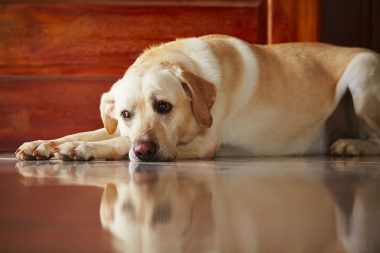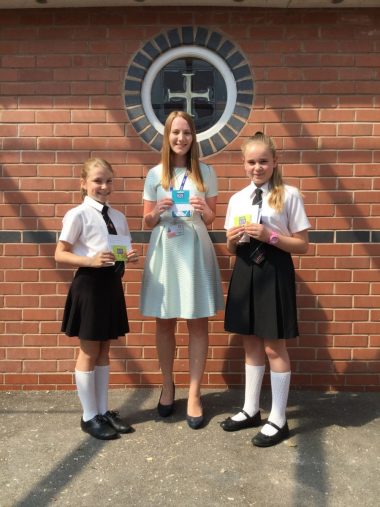
Research has shown that it is not just children who have the ‘back to school’ blues – it is also an emotion experienced by the family pets.
As youngsters go back to school it seems cats, dogs and other animals are just as disappointed after spending six years with arguably their best friends.
Experts in pet care say when pupils return to full time education, cats and dogs are more likely to suffer from separation anxiety, which can result in a change in their animals’ behaviour at the end of summer holidays.

A study by Pets at Home Bromsgrove* revealed that more than four in ten children admitted to having more fun with their pet than they do with their friends or siblings with more than half of children surveyed spending more than an hour interacting with their furry friend each day.
The results also discovered that a third of children are unhappy when spending time away from their pet and one in ten were noticeably upset whilst apart from them.
Carolyn Mentheith, an expert in dog training and behaviour, said: “The main problem with the end of the holidays is that very often the dog will have had 24/7 company as the family are all at home – and then suddenly everyone vanishes and the dog is left home alone.
“This is especially a problem for people who choose to get puppies during the holidays and at a time when they have time to devote to their new arrival”.
“The puppy comes straight from the constant company of their mum and littermates into the home, thinks that their new life will consist of having humans around them all the time – and they never learn the coping strategies needed to cope with being on their own for the very first time in their life”.
Head of pets at Pets at Home Dr Maeve Moorcroft said: “After being surrounded by family for a few weeks, pets get used to the fun and attention children bring them, but a suddenly empty home can affect them”.
“Even well-behaved pets start exhibiting strange or unruly behaviour when this happens, but there are actions you can take to minimise this”.
Alan Philip, store manager at Pets at Home Bromsgrove, has put together five top tips for reducing the amount of anxiety returning to school causes.
And it is hoped after a few days or weeks the pets’ behaviour will return to normal.
Visit www.petsathome.com for more information.

Children aged between five and 11 are being urged to enter a competition to write a bedtime story with the winners getting their creations published.
The contest has been organised by the Book People and the winner will have their book published by Little Tiger and illustrated by top illustrator Alison Brown who will also be one of three judges.
Young authors should create a picture book on the theme of friendship and, as well as Alison on the judging panel, will be head judge Strictly Come Dancing presenter Claudia Winkelman and Absolute Radio presenter Christian O’Connell.
 Campaign ambassador Christian O’Connell said: “My daughters are now ten and 13, but I used to love reading to them at bedtime.
Campaign ambassador Christian O’Connell said: “My daughters are now ten and 13, but I used to love reading to them at bedtime.
“It was always a really nice way of calming down and felt like a full stop on the day”.
“It was always something that I really looked forward to”.
The competition comes amidst shocking statistics released this week which show 28 per cent of parents across the Midlands do not spend any time reading with their primary school-age children.
The figures which come from a YouGov survey of 448 parents in the UK commissioned by The Book People also found 58 per cent of Midlands parents spend less than an hour a week reading to their children, 58 per cent of children have their own tablet while 44 per cent have or share a smartphone.
61 per cent of Midlands parents use a tablet, mobile, TV or a film when distracting their child compared to only ten per cent which give their son or daughter a book to read.
Sarah Walden, Book People Group Buying and Merchandising Director, said: “The findings from the survey are both intriguing and alarming and show that as a nation we can certainly do more to encourage the next generation of readers and authors.
“Electronic devices are always competing for everyone’s attention, but spending a couple hours a week reading with your children works out at less than 20 minutes a day, and allows you to spend true quality time with them”.
“At Book People, we’re passionate about spreading the joy of reading and supporting child literacy, and this year’s Bedtime Story Competition is another great way to engage children in reading, writing and the joy of storytelling”.
The figures mean the UK is ranked only 22nd in the year for reading within the 2015 Pisa school rankings, putting Britain behind countries such as Estonia, Slovenia, Poland and Australia.
 Youngsters have until October 2 to enter the Book People’s Bedtime Story Competition.
Youngsters have until October 2 to enter the Book People’s Bedtime Story Competition.
Visit thebookpeople.co.uk/bedtimestory to find out how to enter this year’s contest.
Stories should be 200 to 800 words in length and on the website there are also hints and tips for story writing.

The charity which promotes walking, scooting and cycling to school has listed ten reasons why parents should try and avoid using the car when doing the school run.
Sustrans is hoping parents who can will change their travel habits in a bid to get their children to be more active.
According to government guidelines, children and young people aged five to 18 need at least 60 minutes of physical activity every day, while adults should get a minimum of 150 minutes a week .At 1.6 miles, the average primary school journey is a distance that can be cycled, scooted or walked as an easy way of building more activity into our busy lives.
Physical activity can increase mental alertness, energy, positive mood and self-esteem, as well as reducing stress and anxiety, according to the Mental Health Foundation.
Teachers find that pupils who walk, cycle or scoot arrive at school more relaxed, alert and ready to start the day than those who travel by car [3].Parents can benefit in the same way and burn some precious calories along the way – a 20-minute bike ride can use the same amount of calories as a cappuccino, a bar of chocolate or a 175ml glass of wine.
The proportion of children walking and cycling to school has been declining in England since 1995, with the number being driven to primary school increasing each year – as many as one in four cars on the road during the morning peak are on the school run. Leaving the car at home means you’ll take the hassle out of parking too.
Up to 40,000 early deaths are attributable to air pollution each year in the UK – only smoking contributes to more early deaths. Road transport is responsible for 80 per cent of the pollution where legal limits are being broken and children are particularly affected. What’s more, those who travel by car can experience five times higher pollution levels than those who cycle and three and a half times more than those walking the same route. Not only is air pollution harmful to humans, it also affects animal and plant life.
Instilling a love of cycling, scooting or walking in children from a young age has long-lasting benefits – as well as developing road awareness to encourage independent travel as a teenager, it can also create good habits for an active adult life.
Cycling, scooting and walking brings you closer to nature and the changes in the seasons. Whether it’s spotting wildlife or noticing the leaves changing colour on the trees, two wheels are better than four when it comes to connecting with nature and get to know your local area.
Cycling, scooting or walking the school run will save you and your family a small fortune.Not only will you be forking out less on petrol, you might also save money on gym fees, leaving you with more cash in your pocket.
From health to road safety, retail and tourism, there is a growing body of evidence demonstrating the economic benefits of cycling and walking. In England alone 10billion annual journeys are undertaken every year by bike and on foot, with an estimated combined economic value of £14billion.
Taking time out of your day to cycle, scoot or walk together is a great chance to catch up on your child’s day and spend quality time with each other while enjoying the fresh air and freedom of travelling under your own steam.
Sustrans has also produced a number of top tips for parents to help them incorporate walking, cycling and scooting into their morning and afternoon routines.
Mornings are a busy time for parents and it can be overwhelming to get your child ready for cycling or scooting on top of other things you need to do before leaving home. With a little preparation cycling or scooting can be the best way to get to school. Here are our top tips to help your child become a bicycle or scooter commuter.
Parents should plan their journey in advance, says Sustrans, choosing a smooth, flat route and avoid steep hills and busy roads where possible. When starting out it’s a good idea for parents to take their child to the park or another traffic-free area to practise their cycling or scooting.
Sustrans is the pioneer and guardian of the National Cycle Network – with thousands of miles of traffic-free routes across the UK, the Network is the ideal place to build confidence. For more information and inspiration visit www.sustrans.org.uk.
Parents are also advised to ensure their child’s or children’s bike(s) are the right size for them and are roadworthy.
Those using scooters should ensure any bolts are tightened before setting off and check the wheels and handlebars are attached securely. Make sure any folding parts are fully locked in the riding position.
Children should wear sensible shoes such as trainers. Flip-flops and sandals aren’t suitable. Avoid wearing baggy clothing which may get caught up in the bike or scooter.
Don’t hang anything on the handlebars as it could upset the balance of the bike or scooter.
If you’re on the road with children take up a position behind them. If there are two adults in your group it’s a good idea to have one at the back and one in front of the children.
Set a good example: follow the Highway Code and teach children road safety and awareness.
When your child is scooting on the pavement make sure you walk nearest the road. Encourage children to go slowly or to walk where necessary when passing other people on the pavement.
Your child should get off their bike or scooter when crossing roads.
Helmets are recommended for young children, though ultimately this is a question of individual choice and parents need to make that choice for their children.
Visit www.sustrans.org.uk/what-you-can-do for more information, advice and support.
 Pulpils from Bromsgrove’s St John’s C of E Middle School Academy have taken part in a competition to name the four suites at Care UK’s new care home Chandler Court, Recreation Road.
Pulpils from Bromsgrove’s St John’s C of E Middle School Academy have taken part in a competition to name the four suites at Care UK’s new care home Chandler Court, Recreation Road.
The children put their thinky caps on and came up with a list of names that have a cultural or historical reference to them and the local area.
They were whittled down to four by the team at Care UK which runs the home.
The ‘Windmill Suite’ has been created to commemorate the 19th century windmill at Avoncroft Museum, the ‘Buckingham Suite’ references the gates of Buckingham Palace which were made by the Bromsgrove Guild, there is the ‘Housman Suite’ named after Bromsgrove poet AE Housman and the ‘Sanders Suite’ has been created after Sanders Park.
Care UK presented the winning children with individual book vouchers to say thank you for all their hard work.
Care UK regional director Daniel Turner-Naylor said: “As we gear up to welcome the first residents to the home later this year, the all-important naming of the suites within the care home is a priority, and we thought this presented an excellent opportunity to work with St John’s C of E Middle School Academy, and to get to know our neighbours a little better.
“The ideas the pupils put forward were all of a very high quality, and we’re really pleased with the chosen four names”.
The new four-storey care home, which will feature 81 en-suite bedrooms, has been designed to enable its residents to live active and fulfilled lives, while also promoting independence. The care home will incorporate space for hobby and leisure activities and will include its own cinema, hairdressing salon and café.
Visit careuk.com/Bromsgrove for more information about Chandler Court which is due to open later this year.
Residents who attended Rubery Council School (now Colmers) and were born around 1933 are being urged to come forward for the seventh annual reunion.
This year the organisers are specifically looking for a number of members, including Rita Carr, Barbara Ash, Margaret Quinton, Margaret Field, Polly Moth, Pamela Dovey, Paul Tranter, Bruce Breakwell and Mike Richardson.
This year’s promises to be the best-attended reunion yet with former students excitedly planning to fly to the event from all over.
The event will be held at midday on November 2 at Hillscourt Conference Centre, Rose Hill, Rednal, B45 8RS.
There will be a buffet lunch and bar.
Admission is £10, which is payable at the event.
In order to calculate seating and catering requirements and prepare name tags etc it is essential that anyone intending going contact Paul Tranter as soon as possible stating their name and the name of any guest/partner they intend bringing.
Call Paul on 0121 445 2463, email him at [email protected] or write to 6 Reservoir Road, Cofton Hackett B45 8PN.